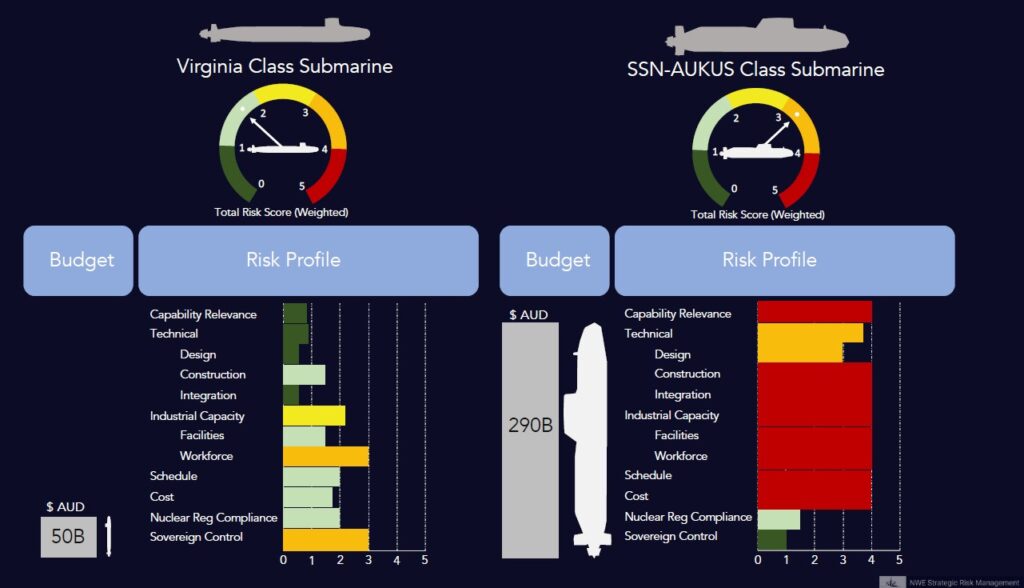
Australia is being advised to reconsider its involvement in the SSN-AUKUS program in favor of expanding its fleet of Virginia Class submarines, according to a newly released risk report. The report, titled AUKUS Pillar 1 – Submarine Platform Risk Comparison, was authored by Peter Robinson, principal of NWE Strategic Risk Management, and published earlier this month.
The report provides a comprehensive risk analysis comparing the acquisition of Virginia Class submarines from the United States against the SSN-AUKUS nuclear-powered submarines under the AUKUS trilateral agreement. Key factors considered include capability relevance, technical relevance, industrial capacity, schedule, cost, nuclear propulsion compliance, and sovereign control.
Strategic Recommendations and Financial Implications
Robinson recommends that the Australian government mitigate sovereign control risks associated with the Virginia Class submarines through robust bilateral agreements, leveraging long-standing alliances such as ANZUS. He suggests withdrawing from the SSN-AUKUS Class program and committing long-term to the Virginia Class Block IV boats, proposing an increase in fleet size to seven or eight submarines to meet capability requirements. This shift could result in a net saving of AU$233 billion for taxpayers.
“At AU$368 billion, AUKUS Pillar 1 is by far the largest investment Australia has ever committed to … and Defence is insolvent as a result,” Robinson stated.
Robinson argues that a clinical view of cost versus risk is essential for making objective decisions in the nation’s best interest. He describes the SSN-AUKUS submarines as a “massive gamble” at a “gigantic price,” advocating for a strategic withdrawal. The acquisition of a small fleet of Virginia Class Block IV submarines, he notes, could offer a programmatic saving of over $230 billion.
“A cost-risk factor (budget x total risk score) produces a 10-times ratio in favor of the US-built submarines. An increased commitment to the Block IV pathway will provide an outstanding capability outcome … without bankrupting Defence,” Robinson emphasized.
Challenges and Risks in the AUKUS Agreement
The report also highlights the challenges associated with the AUKUS agreement, particularly regarding the construction of nuclear submarines. Australia, lacking experience in building nuclear submarines, would face significant construction risks. The shipyards would require substantial upgrades to meet the physical and regulatory demands of nuclear work.
Robinson points out that the UK facilities, specifically at Barrow-in-Furness, are already stretched and require significant remediation, potentially delaying technology transfer. He notes that the last major infrastructure build at these facilities was in the early 1980s, with only modest upgrades since then.
“The sole UK nuclear submarine production facilities have been under-resourced and neglected for many decades,” Robinson commented.
Moreover, Australia currently lacks a nuclear-qualified maritime workforce, and developing one domestically could take decades. This workforce challenge could lead to quality assurance issues and jeopardize the ability to sustain multiple submarines concurrently.
Regulatory and Political Considerations
Robinson also raises concerns about the regulatory and political landscape surrounding the SSN-AUKUS program. Australia’s limited civilian nuclear industry and the absence of an existing regulatory authority for naval nuclear propulsion amplify the risks. Establishing a comprehensive legal and institutional framework is necessary to ensure compliance with international standards.
“For Australia, which currently has a tiny civilian nuclear industry, this risk is magnified by the need to create a comprehensive legal and institutional framework from the ground up,” he explained.
Finally, Robinson addresses the global insecurity surrounding the US administration’s commitment to AUKUS, particularly under former President Donald Trump. Despite concerns, he believes it is unlikely the US will abandon the AUKUS arrangement due to its strategic benefits, including bolstering regional alliances and providing a forward basing hub in the Indo-Pacific.
“It sends a clear message to China of the US intent to bolster the capability of its regional alliance partners,” Robinson noted.
The report concludes with a call for Australia to carefully weigh its options, considering both the financial implications and the strategic benefits of its submarine acquisition strategy. The decision could shape the nation’s defense capabilities for decades to come.






